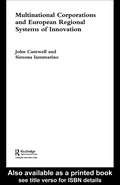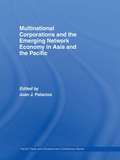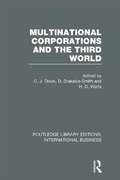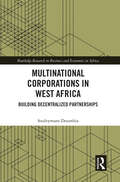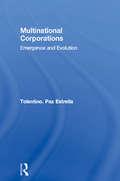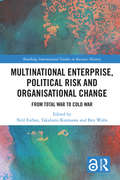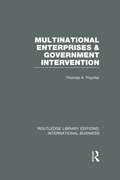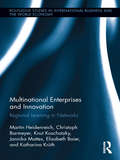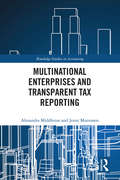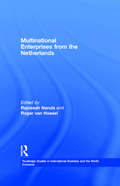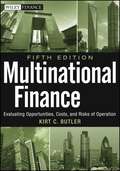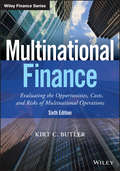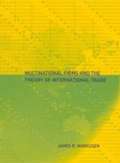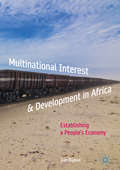- Table View
- List View
Multinational Companies and Domestic Firms in Europe. Comparing Wages, Working Conditions and Industrial Relations
by Maarten Van Klaveren Kea Tijdens Denis GregoryThe Social Effects of FDI on Multinational Companies and Domestic Firms compares and contrasts wages, working conditions and industrial relations processes in multinational and domestic companies. This book is an effort to map the social effects of FDI in a number of EU member states, in relation to the prevailing patterns of internationalization.
Multinational Companies from Japan: Capabilities, Competitiveness, and Challenges
by Robert Fitzgerald Chris RowleySince the bursting of Japan’s bubble economy, from 1990 onwards, its multinational companies (MNCs) have faced new competitive challenges, and questions about the management practices on which they had built their initial success in global markets. Japanese engagement in the international economy has undergone a number of phases. Historically, Japanese MNCs learnt from foreign companies, frequently through strategic alliances. After the post-war ‘economic miracle’, Japanese manufacturers in particular converted themselves into MNCs, transferred their home-grown capabilities to overseas subsidiaries, and made an impact on the world economy. But the period after 1990 marked declining Japanese competitiveness, and asked questions about the ability of Japanese MNCs to be more responsive and global in their strategies, organization, and capabilities. It has been argued that the established management practices of Japanese MNCs inhibited adaptation to recent demands of global competition. This volume presents new case evidence on how Japanese MNCs have responded to the new challenges of the global market place, and it provides examples of how they have transformed strategies and competitive capabilities. This book was originally published as a special issue of Asia Pacific Business Review.
Multinational Corporations And Foreign Direct Investment: Avoiding Simplicity, Embracing Complexity
by Stephen D. CohenForeign direct investment (FDI) and multinational corporations (MNCs)--for better and worse--play a large and growing role in shaping our world. The integrating thesis of this book is the inevitability of heterogeneity in FDI and MNCs and, accordingly, the imperative of disaggregation. Large companies doing business on a global basis increasingly dominate the production and marketing of the world's goods and services. The importance of these companies continues to grow while the debate about their nature and effects remains mired in a long-standing stalemate couched in strong black and white terms. Stephen D. Cohen seeks to reconcile this impasse by analyzing multinational corporations and foreign direct investment in an eclectic, nuanced manner. The core thesis is that an accurate understanding of the nature and impact of these phenomena comes from acknowledging the dominance of heterogeneity, perceptions, and ambiguity and the paucity of universal truths. This approach should contribute significantly to both a better academic understanding and a more productive policy debate of an increasingly important element of the world economy.
Multinational Corporations and European Regional Systems of Innovation (Routledge Studies in Global Competition #Vol. 18)
by John Cantwell Simona IammarinoIn globalising economies, particularly those going through a process of economic integration such as those economies within the EU, regions forge an increasing number of linkages with other locations within and across national borders. This is largely carried out by the technological efforts of Multinational Corporations (MNCs). This book explores the regional dimension of Europe in terms of localised technological comparative advantages and the location of innovative activities by MNCs. Using an empirical analysis John Cantwell and Simona Iammarino cover such important themes as:*MNC technological activities and economic wealth*MNCs and the regional systems of innovation in Italy, UK, Germany and France*the geographical hierarchy across European national borders.
Multinational Corporations and Global Justice: Human Rights Obligations of a Quasi-Governmental Institution
by Florian WettsteinMultinational Corporations and Global Justice: Human Rights Obligations of a Quasi-Governmental Institution addresses the changing role and responsibilities of large multinational companies in the global political economy. This cross- and inter-disciplinary work makes innovative connections between current debates and streams of thought, bringing together global justice, human rights, and corporate responsibility. Conceiving of corporate social responsibility (CSR) from this unique perspective, author Florian Wettstein takes readers well beyond the limitations of conventional notions, which tend to focus on either beneficence or pure charity. While the call for multinationals' involvement in the solution of global problems has become stronger in recent times, few specifics have been laid down regarding how to hold those institutions accountable in the global arena. This text attempts to work out the normative basis underlying the responsibilities of multinational corporations—thereby filling a crucial void in the literature and marking a milestone in the CSR debate.
Multinational Corporations and the Emerging Network Economy in Asia and the Pacific (PAFTAD (Pacific Trade and Development Conference Series))
by Juan J. PalaciosMultinational Corporations and the Emerging Network Economy in Asia and the Pacific delves into the ongoing rise of a global economy anchored in a web of inter-firm production networks and the role played by multinational corporations in the process. It considers the strategies and business models corporations have adopted lately to face today’s highly competitive global markets, especially outsourcing and offshoring, focusing on the modalities observed in Asia Pacific and the Pacific Rim at large. Since their inception, corporations have undergone a series of fundamental changes; each has corresponded to a given era of industrial development and has given rise to a particular type of government policy response. The book addresses these timely issues and other such as the transformation of global production networks into global innovation networks, the link between corporate and national innovation strategies and movement up the global production value chain, and the fragmentation of production and the resulting increase in component and sub-assembly trade in the region. It also takes up the emergence of multinational corporations from developing countries and the efforts aimed at forging basic rules of corporate social responsibility and developing sound institutions for building a working framework of corporate governance in the Pacific. Written by some of the region’s most eminent and influential economists and political scientists, this volume will appeal to students and scholars working in the field of Asia Pacific studies as well as to businesspersons and policymakers taking decisions in the region.
Multinational Corporations and the Third World (Routledge Library Editions: International Business)
by C. J. Dixon D. Drakakis-Smith H. D. WattsThis book is a comprehensive study of the role of multinational corporations in the economies of the Third World. It begins by providing a comprehensive overview of the activities of multinational corporations and the main areas of research and debate. It goes on to discuss specific sociological, developmental and material effects on Third World countries resulting from involvement with multinational corporations. It includes case studies detailing the mid-twentieth century history and probable effects of specific multinational corporations’ involvement in Third World countries.
Multinational Corporations from Emerging Markets: State Capitalism 3.0 (International Political Economy Series)
by Andreas NölkeThe rise of multinational corporations (MNCs) from emerging markets has been a major development during the last decade. An important feature of emerging market MNCs is their close relationship with home states. The book investigates this special kind of relationship and explores how it affects the cross-border activities of these corporations.
Multinational Corporations in Apartheid-era South Africa: The Issue of Reparations
by Cate Reavis Geoffrey G. JonesConsiders the lawsuits filed on behalf of victims of apartheid against multinationals who operated in South Africa prior to 1994. Reviews the debates about divestment from and sanctions against South Africa from the 1950s. Includes case studies of companies that divested--Eastman Kodak and IBM--and stayed--Royal Dutch/Shell and Johnson & Johnson. Concludes with evidence on the use of the Alien Tort Clains Act against corporations in other international contexts.
Multinational Corporations in West Africa: Building Decentralized Partnerships (Routledge Research in Business and Economics in Africa)
by Souleymane DoumbiaThis book investigates the relationship that Multinational Corporations form with Local Authorities and governments in West Africa. It argues that informal partnerships at the local level can provide significant socioeconomic benefits to communities and overcome shortfalls in state provision of infrastructure and collective goods and services. Drawing on in-depth case studies in Niger, Ghana and Liberia, the book demonstrates that Decentralized Partnerships benefit from lower transaction costs while maintaining profitability and investment protection, whereas in formal relationships between multinationals and local government, asset specificity and uncertainty are high. By complying with informal rules, which are in many ways just as restrictive as formal rules, Multinational Corporations can adapt and acculturate themselves, become actors of territorial authorities and can get around the incompleteness of the contract that binds them to the state. Reflecting on a range of local projects (educational, infrastructural, health, micro-financial, entrepreneurial), this book provides a rich and detailed assessment of the interactions between Local Authorities and Multinational Firms. The book will be useful to upper-level students and researchers across the fields of economics, business, sociology, anthropology and African studies as well as to development practitioners and regional and international organizations with interest in the functioning of Multinational Corporations in local environments.
Multinational Corporations: Emergence and Evolution (Routledge Studies in International Business and the World Economy #Vol. 15)
by Paz Estrella TolentinoThis work presents case-studies of the emergence and evolution of Multinational Corporations (MNCs) based in eleven developed and developing countries of widely divergent patterns of national development. From this analysis, Tolentino develops a comprehensive theory of the emergence and evolution of MNCs from a macroeconomic perspective.
Multinational Enterprise, Political Risk and Organisational Change: From Total War to Cold War (Routledge International Studies in Business History)
by Neil Forbes Ben Wubs Takafumi KurosawaHitherto, the organization of international business has been studied mostly from a managerial point of view or by examining the relationship between firms and the economy. Yet, the development of the modern, multinational firm - the most important type of business organisation - has been strongly influenced by the conflicts that bedeviled the twentieth century. The volatile macroeconomic and political environments experienced by international business point to how important it is to study political risk. Consequently, Multinational Enterprise, Political Risk and Organisational Change: From Total War to Cold War breaks new ground: it argues that non-market elements and historical context are key to understanding the way international business has been organised. This edited volume offers an historical approach to analysing how multinational enterprise has developed over time and around the world, through a series of well-crafted chapters, on important topics in international economic and business history, written by authorities in their respective fields of study and research. The study is based on the underlying premise that the coming of the two World Wars, the devastating and long-term consequences of such total wars, and the ideological challenge of the Cold War acted as a pivot points in shaping the nature and character of multinational firms. By examining such phenomena, this study offers insights to anyone who has an interest in business, economic or political history, management and business studies, or international relations.
Multinational Enterprises and Government Intervention (Routledge Library Editions: International Business)
by Thomas A PoynterGovernment intervention can reduce the profits of multinational enterprises. These interventions also increase uncertainty and risk and distort trading and intra-firm sourcing patterns. The focus of this book is a corporate survival plan that describes how a multinational can monitor its exposure to intervention and then seek to reduce it. It reports on the successes and failures of firms as they implement various global management systems and recommends a general strategy. Such a strategy will allow multinationals to continue foreign investment with the longer term horizons that will benefit both the firms and their host countries.
Multinational Enterprises and Innovation: Regional Learning in Networks (Routledge Studies in International Business and the World Economy)
by Martin Heidenreich Katharina Krüth Christoph Barmeyer Knut Koschatzky Jannika Mattes Elisabeth BaierThe crucial actors of a global knowledge-based economy are multinational enterprises (MNEs). MNEs depend on the embeddedness in an institutional framework; their competitive advantage depends on the cross-border utilisation of regional and national capabilities. The innovativeness of a company is therefore based also on regional innovation systems. Multinational Enterprises and Innovation contributes to a better understanding of the interconnectedness between organisational and regional learning. On the basis of case studies in Germany and France, this volume investigates how MNEs cope with technical, economic and institutional uncertainties by drawing upon the complementary strengths of organisational and regional networks in national and European contexts. The book links two theoretical debates which are currently still largely disconnected -- the debate on learning processes in MNEs and the debate on the regional bases of innovativeness and competitiveness -- answering the question of how the internationalisation of R&D is reconciled with regional competences.
Multinational Enterprises and Technological Spillovers (Routledge Studies in Global Competition)
by Tommaso PerezAn analysis of the impact of inward investment on the competitiveness of indigenous firms, Multinational Enterprises and Technological Spillovers draws on evidence from the UK and Italian manufacturing sectors to show how foreign presence may generate both virtuous and vicious circles of development according to a number of interrelated factors. These include the level of the foreign presence, its rate of increase, the technological disparities between foreign and indigenous firms and the political response. An examination of the productive and innovatory activities of US and Japanese firms in Europe is also provided to enlighten the differential role of European countries in the global operations of overseas multinationals.
Multinational Enterprises and Transparent Tax Reporting (Routledge Studies in Accounting)
by Alexandra Middleton Jenni MuttonenThis book examines tax transparency as part of multinational enterprises’ corporate social responsibility (CSR). It considers revelations like the Panama and Paradise Papers that shed light on corporations’ tax practices and the growing public dissatisfaction, resulting in legislative projects, such as the Organisation for Economic Co-operation and Development (OECD) base erosion and profit shifting. Tax transparency is defined as companies’ voluntary disclosure of numerical tax data (e.g. taxes paid by country) and other tax-related information (e.g. tax policies). It is set apart from tax avoidance and tax evasion to clarify the often-blurred concepts.In this book, tax transparency is placed in a historical context and possible drivers and hindering factors to tax transparency are investigated. Tax transparency is discussed in the light of socio-economic theories (stakeholder, legitimacy, institutional theory and reputation risk management), as well as economic theories (agency theory, signalling, proprietary costs) and information overload theory. The book provides examples of tax transparency development of the largest multinational enterprises in five countries (France, Germany, UK, Finland and USA) in six years, 2012–2017, a period featuring increased media coverage of tax matters and legislative movement in the OECD and the European Union. The future of tax transparency is discussed in light of quality characteristics, assurance of information and potential use of artificial intelligence.Companies’ managers and tax and CSR specialists benefit from the book by gaining insight into how to design transparent, high-quality tax reporting. Assurance professionals can use information about the quality criteria of tax transparency. Regulators can track historical development and see examples of voluntary tax transparency in companies’ reporting. Scholars and students obtain theoretical framework for analysing the tax transparency phenomenon and the ability to distinguish between the concepts of tax transparency, planning, avoidance and evasion.
Multinational Enterprises from the Netherlands (Routledge Studies in International Business and the World Economy #Vol. 8)
by Rajneesh Narula Roger Van HoeselDespite the long history of international economic activity and the dominant role of Dutch MNEs in the world economy there has been relatively little academic research in the area. This book explores issues such as: * What historical precedents underlie the character of Dutch MNE activity * How and why the technological specialisation of the Dutch economy and its firms has evolved to its current state * The changing FDI activity of Dutch MNEs * The strategic aspects of Dutch MNE activity in terms of location and R&D * The implications for Dutch MNEs of globalisation and economic integration Comprehensive in its coverage, this book will be of great interest to students and researchers in international business.
Multinational Enterprises in Latin America since the 1990s
by Pablo ToralPrivatization of state-owned enterprises and liberalization of trade and investment flows were two of the cornerstones of the structural reforms implemented by governments across Latin America in the 1990s. Spanish multinational enterprises were attracted by these reforms into industries such as banking and finance, telecommunications, public utilities, and oil and gas. By the late 1990s, Spain passed the United States as the main origin of foreign direct investment flows in Latin America. Building on the know-how developed in previous decades in Spain, Spanish multinationals became major player in these sectors that constituted the backbone of the Latin American economies.
Multinational Enterprises, International Trade, and Productivity Growth: Firm-Level Evidence from the United States
by Wolfgang Keller Stephen R. YeapleA report from the International Monetary Fund.
Multinational Finance, + Website
by Kirt ButlerAn in-depth treatment of the international financial arena Multinational Finance, Fifth Edition assumes the viewpoint of the financial manager of a multinational corporation with investment or financial operations in more than one country. This book provides a framework for evaluating the many opportunities, costs, and risks of multinational operations in a manner that allows readers to see beyond the math and terminology surrounding this field to realize the general principles of multinational financial management. Logically organized and written in a clear, non-technical style, this book includes information on international finance topics such as foreign exchange, currency and derivatives markets, currency risk (transaction, operating, and translation) management, country risk, international taxation, capital structure, cost of capital, and international portfolio diversification. It also offers unique chapters on multinational treasury management, the rationale for hedging currency risks, options on real assets, international corporate governance, asset pricing, and portfolio management. Emphasizes the managerial aspects of multinational finance with graphs, figures, and the use of numerous real-world examples Expands on the treatment of parity disequilibria to include exchange rate expectations that differ from parity and a project's operating exposure to currency risk Provides an overview and comparison of the various derivative instruments and their use in risk hedging Contains valuable insights on valuation and management of a multinational corporation's investments If you're looking for the best way to gain a firm understanding of multinational finance, look no further than the fifth edition of this classic text.
Multinational Finance: Evaluating the Opportunities, Costs, and Risks of Multinational Operations (Wiley Finance #729)
by Kirt C. ButlerDeep coverage and rigorous examination of international corporate finance Multinational Finance offers an advanced exploration of international corporate finance concepts and operations. Despite its status as one of the most rigorous texts on the topic, this book remains accessible and readable without sacrificing depth of coverage. Sidebars, key terms, essays, conceptual questions, and problems with solutions help aid in the learning process, while suggested readings and PowerPoint handouts reinforce the material and offer avenues for further exploration. This new sixth edition includes Excel templates that allow students to use real-world tools in a learning environment, and the modular structure facilitates course customization to individual objectives, interests, and preparatory level. The emphasis is on the basics of financial management, but coverage includes unique chapters on treasury management, asset pricing, hedging, options, and portfolio management in addition to traditional finance topics. International finance is a diverse field with myriad specialties and a vast array of possible interests. This book allows students to view the field through the lens of a financial manager with investment or financial options in more than one country to give them a practical feel for real-world application. Understand the nature and operations of international corporate finance Evaluate opportunities, costs, and risks of multinational operations See beyond the numbers and terminology to the general principles at work Learn the markets, currencies, taxation, capital structure, governance, and more Comprehensive, adaptable, and rigorously focused, this book gives students a solid foundation in international corporate finance, as well as a sound understanding of the tools and mechanics of the field. Designed for MBA and advanced undergraduate courses, Multinational Finance provides the deep coverage so essential to a solid education in finance.
Multinational Firms and Impacts on Employment, Trade and Technology: New Perspectives for a New Century (Routledge Studies In Global Competition Ser. #Vol. 11)
by Robert E. Lipsey Jean-Louis MucchielliFor decades governments, politicians, and trade unions have feared that firms investing abroad involved a loss of employment and a decline in wages for the home country, the implied assumption being that global production and consumption are somehow fixed. Similarly, research on multinational firms has tended to present them as having a number of a
Multinational Firms and the Theory of International Trade
by James R. MarkusenDespite the great importance of multinational firms in international economics, theoretical and empirical research on these firms has generally been conducted separately from that on international trade. In this book, James Markusen provides a comprehensive integration of the two fields. Drawing on twenty years of research, he focuses on the interaction of scale economies, trade costs, factor endowments, and imperfect competition. He analyzes decisions about whether to build or acquire a foreign plant separately from decisions about where to raise the financing. Markusen begins with the simplest possible partial equilibrium models and works systematically toward a full-fledged general equilibrium model with both horizontal and vertical foreign direct investment. He offers empirical tests of hypotheses derived from the theoretical models. The notation is unified throughout, distinctions between models are explained with thoroughly explained derivations, and numerous graphs support the analysis.
Multinational Firms: The Global-Local Dilemma (Routledge Studies In Global Competition Ser. #Vol. 10)
by John H. Dunning Jean-Louis MucchielliAt the turn of the century, questions about multinational firms' strategies as regards the forces, on the one hand, of globalization and, on the other hand, of the regional and local dimensions are very much to the fore. What are the new constraints and the new theories to explain global-local multinationals' strategies at the beginning of this new
Multinational Interest & Development in Africa
by Ilan BijaouiThis book analyzes the current economic situations in African countries at the local, regional, and national level. It examines the growing interest from developed and developing countries to invest in Africa and their different reasons for doing so, which aren't always aligned with the interests of African countries. Growth in African GDP has benefitted mainly multinational corporations while the rest of the population remains at the subsistence level, creating a smaller middle class and less opportunity for local businesses to flourish. This book offers potential models of cooperation which could create added value for both African countries and the MNCs investing in them.



